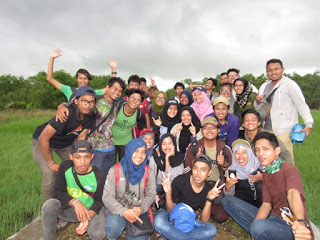Last visited this place may be AWC 2017 with Mas Kir, Mas Asman and Bionicers where the river flow is covered by aquatic plants so we must be more alert in stripping around. The hut before the occasional bridge can still be a place of refuge in the rain or the stinging heat that alternates at that time.
This year, I came back to this place with rain all the way until it became clear once we got to the location. From a distance the hut I visited last year looked dangerous because the woods blackened and lost its power.
Not yet had time to prepare the observation equipment and raincoats are still attached to the body, various types of birds bersliweran as if greet me. Black-crowned Night Heron and Striated Heron fly from various directions. Some individuals of the Blue-tailed Bee-eater flew and briefly perched on the edge of the open branch, unfortunately the camera was not ready at the time.
Not far from where the sea kisses had perched, Purple Swamphen from the Rallidae family aka cock-ayaman who likes in the surrounding of this water is sunbathing after a few hours ago the rain forced her to hide. Across the bridge, Sunda Coucal is also sunbathing with casual regardless of us who had been aiming for him.
Two real ducks are just silhouettes flying eastward, but can still be identified thanks to a slightly bumped head, Itik Benjut (Sunda Teal) as the name suggests. On the cable leading to the pond, birds such as Layang-layang asia (Barn Swallows), Pacific Swallows, Plain Prinia, Yellow-bellied Prinia and Cerulean Kingfisher.
Fun to observe forgot with the entourage next door who are in different locations. They are actually just east of us, on a different bridge from the same river. One bag containing 4 binoculars, a bag containing two binoculars and a monocular is here, they just carry a tripod (laugh evil).
I also took the initiative to delegate 3 binoculars and a bag of bread to be exchanged for a tripod to be all happy. Got there, they were scattered. Mas Imam who managed to get up early and piggyback Wicak towards this place is busy directing the camera. The gang of girls is trying to observe without any binoculars directly scrambling the binoculars that I carry. Differences with Bodrex who prefer to take a white plastic bag containing bread. The tripod in Tharik's hands, he "nlusup" to the rice fields quite far away, "What is the function of tripod for observation if not bring the camera or monoculer to 'nyeblok' in the rice fields like that. Why not be left near the motor only. You are too trustful to keep the tripod, son ", I thought.
Back to the first group, they were already preparing to move following the second group. "Ngerti ngono rasah balik nyangking tripod cah!" Just briefly join the second group, we decided to move east again, following friends from Mapala Sulfur University Tidar and Bogowonto Indonesia Adventure Purworejo already there.
White-capped Munia is ahead of farmers harvesting rice-rice. Yellow Bittern, Cinnamon Bittern, Red Ruddy-breasted Crake, White-browed Crake and White-breasted Waterhen are quite easy to find. I do not need to get too deep in the mangrove forest with the entourage because the weather was overcast, unlike last year and the previous years are hot sting. No need ndangak.
The clock is almost at 12:00 pm but the weather is still cloudy and even tends to rain. Discussion sessions began, slightly different from the previous discussion sessions, they prospective members are required to know the family of birds that will be described first. This method is effective enough to help identify the birds that they will encounter when making their own observations, at least to say "a kind of herons (ardeidae), ryotoe patches, etc." I myself a little more memorized because often write this type of family is repeated as a Bionic Field Operations first. So please be advised.
This year's AWC is more crowded than the previous year, 22 Bionicers, 1 BIA Purworejo, 4 Mapala Sulfur and 2 Biolaska. Recorded 36 species of birds, of which 15 species including water birds. There is still time for the next AWC, tomorrow, tomorrow and hopefully next year too.

No comments:
Post a Comment
Terima kasih sudah berkunjung.
Tinggalkan komentar Anda dan kami akan mengunjungi halaman Anda.